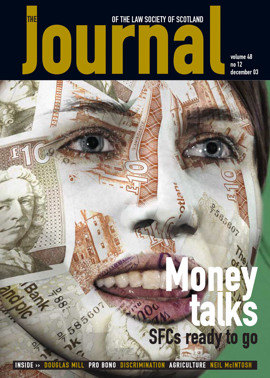Victims find a voice
Victim statement schemes are now being piloted in two areas, under the framework set out in section 14 of the Criminal Justice (Scotland) Act 2003. The aim is to encourage greater participation of victims of crime within the criminal justice system. Victims will have the opportunity of explaining in the statements, how the particular crime has affected them and can describe the psychological, physical and financial impact of the crime.
The first pilot scheme, run by Victim Information and Advice, covers the Sheriff and High Courts in Edinburgh; the second, run by the Crown Office and Procurator Fiscal Service, covers Ayr and Kilmarnock Sheriff Courts and the High Court on circuit in Kilmarnock. The pilots will run for two years and will be evaluated during that time.
All cases received by the procurator fiscal after 25 November 2003 and which have an identifiable “victim” in terms of the scheme will be sent a victim statement pro forma along with an explanatory booklet. The most obvious cases are all forms of assault, thefts from the person and housebreaking. Where the original victim has died the next of kin will be able to complete a victim statement. The form can be completed by a third party where victims are unable to do so themselves.
The accused’s solicitor or the accused themselves will be allowed access to the victim statement, either after a plea of guilty has been tendered or a finding of guilt has been made. Once the statement has been submitted, it cannot be withdrawn, although it may be updated with the procurator fiscal’s agreement. The statement must be put before the sheriff or judge after the recording of a guilty plea or after conviction. The fiscal has no discretion in this regard. The withdrawal of the statement, for example, cannot form part of a negotiated plea.
The accused has the right to challenge all or any of the contents of the statement. If a challenge is made, the court will fix a diet of proof to enable evidence to be led in support of the statement. It is envisaged that this evidence would normally be oral evidence from the victim, perhaps with supporting documentation or other witness testimony.
The legislation states that the court “must have regard” to the victim statement but it remains a matter of judicial discretion what weight it will carry in determining an appropriate sentence. It is hoped that allowing victims to participate in the sentencing process will have a beneficial effect and make them feel more involved.
The victim will be made aware that he or she must not make any suggestions about an appropriate sentence, or comment about any matters not connected with the specific case. Where a statement contains inappropriate remarks or refers to a charge which is not before the court, the sheriff or judge will be expected to disregard them. The statement cannot be altered by any other parties.
If the accused appears from custody a short time after arrest, and pleads guilty at the first hearing, the victim will not be invited to make a victim statement, due to the difficulties of completing and submitting the statement within the time available. Cases which originate in a pilot scheme area but are subsequently transferred to other jurisdictions for trial, will still be subject to the victim statement scheme.
As neither the victim statement nor its contents can be disclosed to the defence before a finding of guilt is recorded, the victim cannot be precognosced as to whether he or she has made a victim statement or what he or she has said in that statement. However, once the statement is in the hands of the defence solicitor, it should be treated in the same way as a precognition.
In solemn cases where a criminal legal aid certificate exists, the defence solicitor will be paid for work carried out in accordance with the victim statement under that same certificate on a time and line basis. With regard to summary criminal legal aid, there is no funding currently built into the fixed payment to cover matters related to the victim statement. At the time of going to press, the legal aid regulations dealing with those cases are not yet in place. However, the current thinking by the Scottish Executive is that for any adjourned diet required to enable the solicitor to consider the terms of the statement, the usual deferred sentence fee would be charged. Where the matter requires to proceed to proof, the normal trial day fee will apply.
The Victim Statement Steering Group will continue to monitor the progress of the pilot scheme throughout its two year duration.
The Law Society is represented on the Steering Group and the Deans of Faculties involved in the implementation of the pilot schemes have been kept informed as matters have progressed.
Solicitors are invited to make any comment on the implementation of the scheme, either direct to their Deans of Faculty or to the Society’s Criminal Law Committee.
In this issue
- Staying awake, actually
- Keep sane, if not sober
- Obituary – Sheriff Frank Middleton
- Money matters
- Clear and present danger
- For love or money
- Setting off abroad
- Legacy giving
- Marking out the pitch
- A merry spam-free Christmas
- Opening up the bench
- Victims find a voice
- Round the houses
- Allowing sexual questioning
- Scottish Solicitors’ Discipline Tribunal
- Discrimination: widening the net
- New rights for farm tenants
- Protection sans frontieres
- Football’s financial red card
- Website reviews
- Book reviews
- Asbestos safety
- Housing Improvement Task Force
- SDLT: registration requirements






